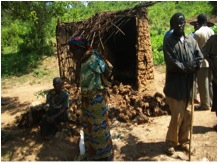Batwa Communities Respond to Anti-thatch Campaign in Rwanda
The Batwa pygmies are Rwanda’s earliest known inhabitants. While they lived in isolation for centuries in forest communities, they were eventually displaced and expected to integrate into mainstream culture. Known as “the Potters” because of the earthenware that they craft and sell for income, the tribe continues to face social exclusion and discrimination that have led to extreme poverty, high risk for HIV, and high child mortality. Now the Batwa face a new challenge to one of the most basic of human rights – a home.
A new national campaign to destroy thatch-roofed housing (called "Bye Bye Nyakatsi") has the aim of transitioning Rwandans to live in stronger, permanent housing. In some areas, communities are working together to shift families to new, permanent structures. However, in other areas, houses are being destroyed before their occupants can rebuild. The poor and the elderly often lack the means, along with any alternate source of shelter. The Batwa have been disproportionately affected.
Earlier this year, the homes of 2000 Batwa people in one mountain community near Nyaguru National Park were destroyed. Poor families were forced into the cold and rain with nowhere to go. COPORWA, a Batwa-led organization and Firelight partner, is helping to rebuild, and to mobilize support for those who have lost their homes.
Firelight has also helped fund activities to strengthen the organization itself. COPORWA strengthened the staff’s English skills, financial management systems, communication and advocacy tools, as well as the monitoring and evaluation of its own activities.
Through emergency funding earlier this year, COPORWA provided food aid and blankets to 60 households whose homes had been destroyed. COPORWA is building 10 new houses while the community and local government will contribute towards constructing the remaining 50 houses.
Working hand in hand, the Potters and COPORWA are erecting new, stronger houses and raising iron-sheet roofs. Community-based organizations like COPORWA provide an important safety net for hard-to-reach, vulnerable communities. When grassroots organizations are engaged at a national level, they can help to ensure that noble intentions are actually realized for the most vulnerable children, families and communities.
And now, even as the destruction of their housing continues, so does COPORWA’s commitment to the Batwa, to advocacy both nationally and internationally, and to restoring shelter, security, and dignity, one family at a time.


